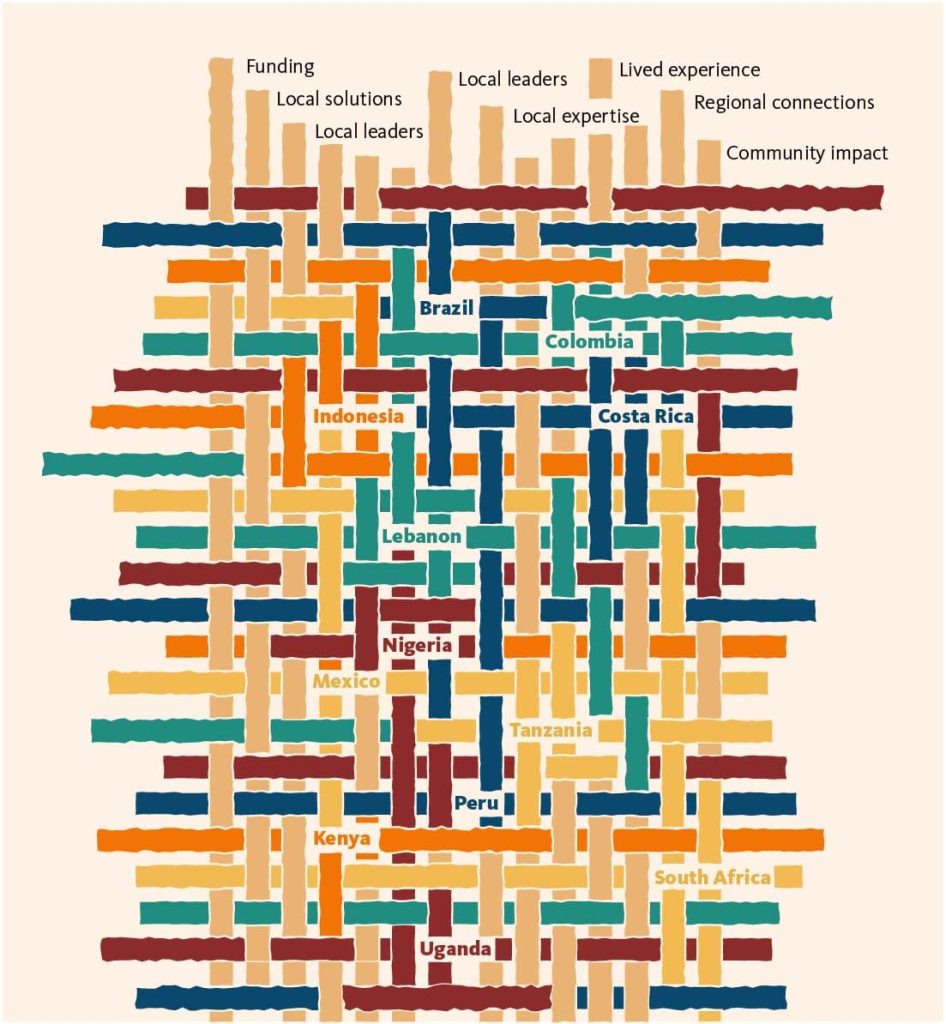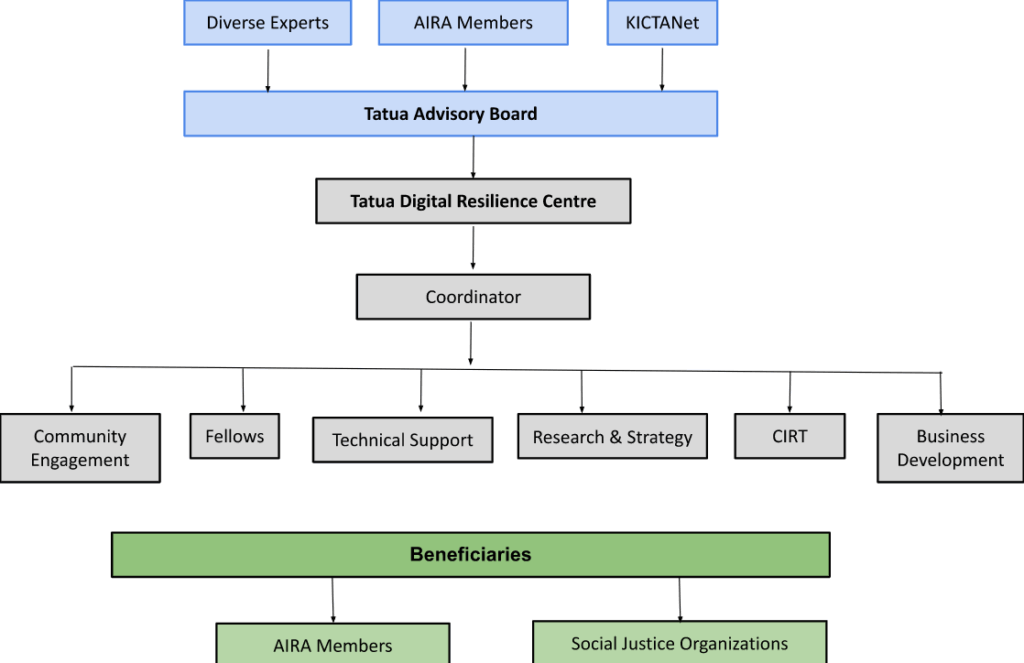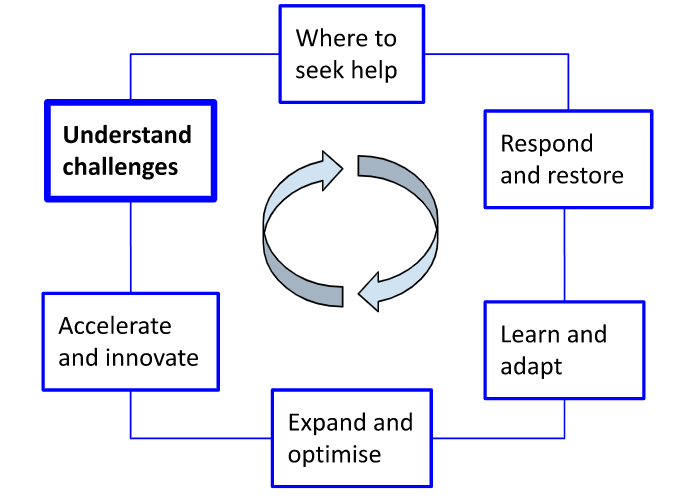Over the past decade, technology and digital platforms have emerged as critical instruments for the promotion of human rights. Social Justice Organizations (SJOs) in Africa are increasingly relying on technology and digital platforms for their work. However, they have not fully grasped the extent of their dependency on digital technologies, and neither are they fully aware of the opportunities and risks presented by the digital environment for their work. The key challenges faced by SJOs in the region include the shrinking civic space; restrictive and hostile operating environments; their limited capacity, knowledge, and awareness of digital resilience; the adverse impact of COVID-19; and funding limitations that inhibit their activities.
In response to these challenges, KICTANet established the Tatua Digital Resilience Centre to offer a bouquet of services to SJOs in East Africa to enhance their digital resilience, quickly respond to and recover from digital threats, and harness the power of technology to enable them to achieve their mission in a digitally changing environment.
The Tatua Digital Resilience Centre supports social justice organisations in East Africa, to maintain, grow, change, recover and survive in a changing environment by implementing effective digital strategies. It provides support to SJOs in Kenya, Tanzania and Uganda working to advance digital rights. Afterwards, it will scale to other organisations in East Africa, and ultimately, the continent. The funding for the centre is initially from donor funds. It will in future adopt a subscription model and subsidised cost of services such as co-payment or contribution to the cost of services. In discharging its functions, the centre fosters strategic relationships to enable it to discharge its mandate.
Our Vision: Transformed safe communities through the power of ICTs.
Our Mission: Promote an enabling environment in the ICT sector that is robust, open, accessible, and rights-based.
Core Values: Transparency, accountability, integrity, inclusivity and good governance.
Resilience Board: The Tatua Digital Resilience Advisory Board is composed of KICTANet, CIPESA, Pollicy, CIPIT, Article 19 Eastern Africa, and iHub.
Geographical reach: East Africa – Kenya, Uganda, and Tanzania.
Languages: English and Kiswahili.
The Centre is also part of a wider network of resilience hubs in the region under the Ford Foundation’s Weaving Resilience initiative for Stronger Civil Society in the Global South. These are interrelated yet highly localised resource hubs in eight regions across the Global South so regional organisations can empower each other with the expertise and tools they need to build and sustain social change as shown in the figure below. Together, they seek to address three central challenges facing civil society: institutional resilience, strategic relevance, and holistic well-being.

Weaving Resilience for a Stronger Civil Society in the Global South
The Centre has an Advisory Board made up of representatives of Africa Internet Rights Alliance members in East Africa (i.e., KICTANet, CIPESA, Pollicy, ARTICLE 19 Eastern Africa, Strathmore University (CIPIT), and iHub), and a select group of diverse technical experts to provide overall leadership and policy direction.
The AIRA network provides a platform to co-create, learn, explore, and share areas of common interest; understand the perspective of other teams, and how collaboration can be enhanced; and ensure the network is engaged as one of the resilience centres. The diversity of membership provides unique insights into the context in the different countries and supports coordination with local social justice organisations.
KICTANet provides the secretarial services and oversees the day-to-day management of the Centre, through a Coordinator. The Coordinator shall be a person with technical expertise and management experience, and other officers within the centre will support functions of the centre such as cyber incident response; research and strategy; technical support; community engagement; in-country technology fellows; and business development.

The purpose is to strengthen institutional resilience by enabling organisations to maintain, grow, change, recover, and survive by employing effective digital strategies. In particular, it strengthens digital resilience aspects such as governance, accountability, leadership, culture, situational awareness, innovation, adaptive capacity, research, and risk management. The Centre is diverse and inclusive at all levels and draws its expertise from the continent and the global South.
The Centre has set up a hub in Kenya and nodes in Tanzania and Uganda to support social justice organisations in East Africa. These are responsible for conducting audits and assessments, developing policies, training, research, coordination of the board, monitoring and evaluation, and reporting frameworks.

Model for digital resilience
Anchored in an anti-colonial, anti-patriarchal, anti-racist, and anti-ableist frame that
a) Privileges feminist principles and perspectives,
b) Rests on power analysis,
c) Recognises and fights against male-centric paradigms and white privilege,
d) Confronts and deconstructs ableism,
e) Re-affirms visions from and capacities in the Global South,
f) Consolidates the Global South’s role in building resilient and impactful institutions,
g) Develops a South-based network of resource hubs that permeates dominant Global North paradigms of institutional development and resilience.
We are calling on Social Justice Organisation in East Africa to contact us for their digital resilience needs. You can write us an email and we will respond promptly.
The Tatua Digital Resilience Centre, established by KICTANet, empowers Social Justice Organizations in East Africa to strengthen digital resilience, recover from threats, and harness technology for human rights work. Serving Kenya, Tanzania, and Uganda, it offers strategic support, fosters partnerships, and plans to expand across Africa with sustainable funding models.

Nine Planets, Earth Wing, Suite E9, Kabarnet Garden Road, Nairobi, KENYA | Phone: 254 110 730 730 | Email: info@tatua.digital
© 2025 TATUA DIGITAL RESILIENCE CENTRE